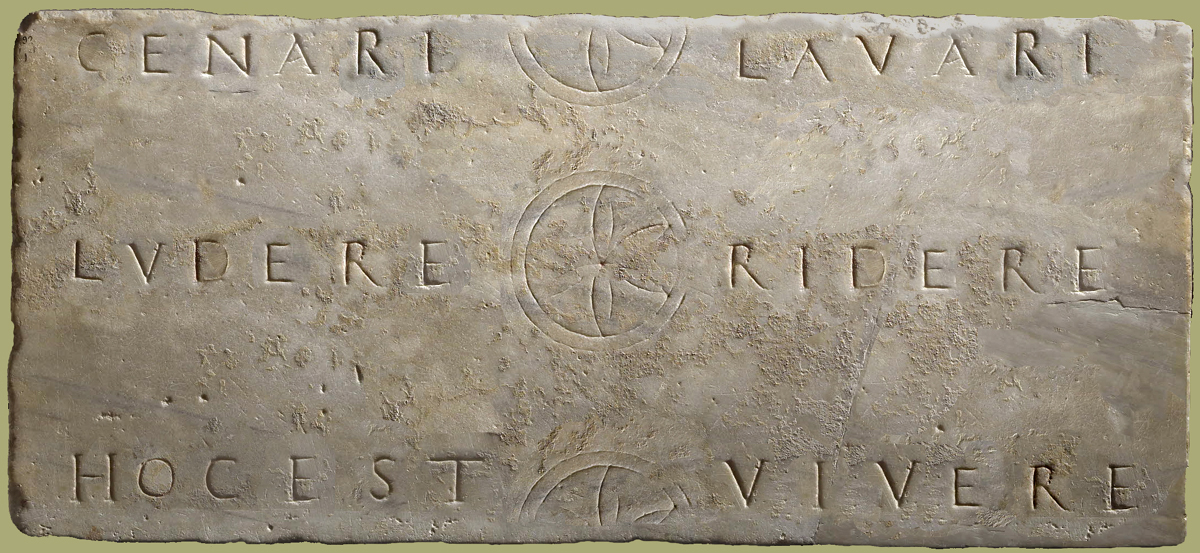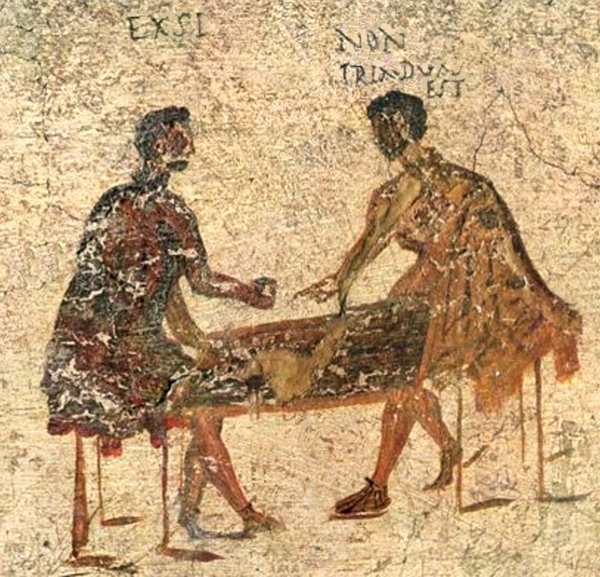Laus Pisonis
ca. 50 p. Chr. n.
|
|
Ludi Romani
|
|||
|
______________________________________________________________________________
|
||||
Duodecim scripta
De lusionis ratione.
De lusus initio.
Iter, quo calculi per alveolum moventur, a media figura rotunda incohatur. Inde uterque lusor calculos in diversum promovet. Habetur autem unaquaeque littera pro areola lusoria pariterque ambae figurae tractuum superioris et inferioris.Uterque autem lusor duodenos eiusdem coloris calculos accipit et tesseram. Deinde uterque simul suam tesseram iacit. Is vero, cui plura puncta obtigerunt, ludum incohat duas tesseras simul iaciens duosque calculos per tot litterarum spatiola alterutrius verbi medii promovens ab interiore parte ad exteriorem, quot puncta iactu tesserarum sortitus est. Deinde alter lusor tesseras iaciens duos calculos in altero verbo medio ponit. Sic lusores alternatim binas tesseras iacere pergent, usque dum uterque omnes calculos suos in suo verbo primo posuerit. Itaque fit, ut in eadem areola interdum complures calculi ponantur.
De lusionis processu.
Postquam omnes calculi in abaco impositi sunt, ludus ipse incohatur. Nam uterque lusor iuxta numerum punctorum tesseris obtentorium calculos in superiorem verborum ordinem dirigit, ubi calculi utriusque lusoris in diversum promoventur. Tamen tum singuli non iam obligantur, ut binos calculos iuxta tesserarum iactarum numerum promoveant. Sed numerus utriusque tesserae uno calculo promovendo expleri potest. Transitur autem a fine superioris ordinis verborum ad inferiorem, ut lineamento subiuncti patet:
| ||||
5 | δήποτε γὰρ Ζήνωνα, πολισσοῦχον βασιλῆα,παίγνιον ἀφράστων ἐκτελέοντα κύβων,τοίη ποικιλότευκτος ἕλεν θέσις, εὖτ' ἀπὸ λευκοῦ,τοῦ καὶ ὀπισθιδίην εἰς ὁδὸν ἐρχομένου,ἑπτὰ μὲν ἕκτος ἔχεν, μίαν εἴνατος· αὐτὰρ ὁ σοῦμμος | |||
10 | δισσὰς ἀμφιέπων ἶσος ἔην δεκάτωι,ὅς τε πέλει μετὰ σοῦμμον ἔχεν δύο· μουνάδα δ' ἄλληνψῆφον τὴν πυμάτην ἀμφιέπεσκε δίβος.ἀλλὰ μέλας δισσὰς μὲν ἐν ὀγδοάτωι λίπε χώρωικαὶ τόσσας ἑτέρας ἐς θέσιν ἑνδεκάτην· | |||
15 | ἀμφὶ δυωδέκατον δὲ διέπρεπον εἴκελοι ἄλλαι,καὶ τρισκαιδεκάτωι ψῆφος ἔκειτο μία·δίζυγες Ἀντίγονον διεκόσμεον· ἀλλὰ καὶ αὐτῶιἶσος ἔμιμνε τύπος πεντεπικαιδεκάτωι,ὀκτωκαιδεκάτωι πανομοίϊος· εἰσέτι δ' ἄλλας | |||
20 | εἶχεν διχθαδίας τέτρατος ἐκ πυμάτου.αὐτὰρ ἄναξ λευκοῖο λαχὼν σημήϊα πεσσοῦκαὶ τὴν ἐσσομένην οὐ νοέων παγίδα,τριχθαδίας ἀδόκητα βαλὼν ψηφῖδας ἀπ' ἠθμοῦπύργου δουρατέου κλίμακι κευθομένηι, | |||
25 | δοιὰ καὶ ἓξ καὶ πέντε κατήγαγεν· αὐτίκα δ' ὀκτὼἄζυγας εἶχεν ὅλας πρόσθε μεριζομένας.τάβλην φεύγετε πάντες, ἐπεὶ καὶ κοίρανος αὐτὸςκείνης τὰς ἀλόγους οὐχ ὑπάλυξε τύχας.Anth. Palat. IX, 482
AGATHIAS SCHOLASTICUS We Mortals of no account, even if we perform great deeds, do not survive long in the memory of anyone; but as for the great, if they do nothing, if they only breathe, as the Libyan said, it is engraved in adamant For instance Zeno, the lord and emperor of our city, while in the middle of a game played with the capricious dice, found himself in this complicated position: when of the white men who were on their way back, the sixth line contained seven, the ninth one, and the tenth and sutmnus two each, while the line after the summus had two, and the last piece was on the dims. Black had two on the eighth line, and as many on the eleventh; on the twelfth were two, and one on the thirteenth. There were two on Antigonus and also on the fifteenth and eighteenth, and the fourth line from the last (the twentieth) also had two. It was the king's turn to play for White, and not seeing the trap in store for him, he cast the three dice from the wooden box with its hidden ladder, and threw two, six, and five, so that at once he had eight single pieces in all which had formerly been next others. Avoid backgammon, as the king himself did not escape from its blind chance. |
|||




